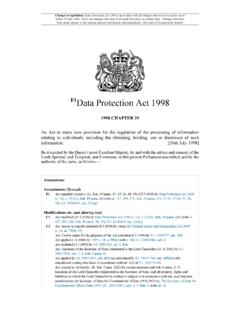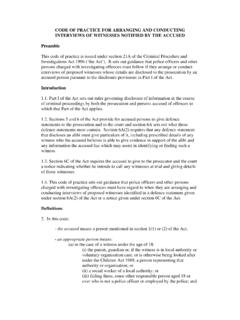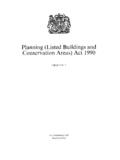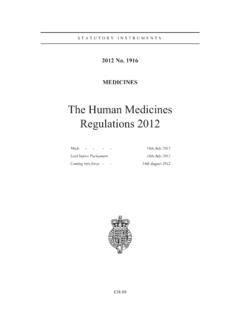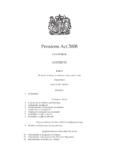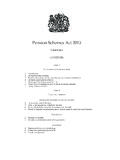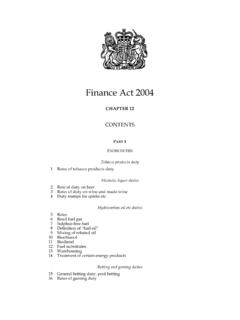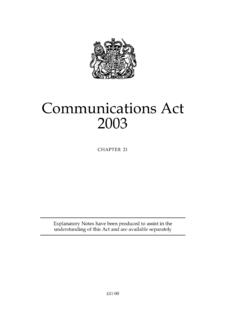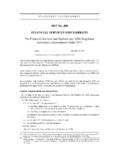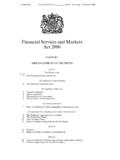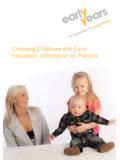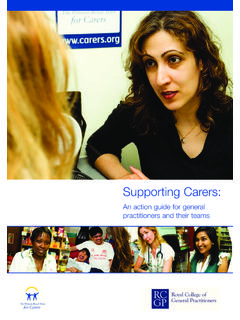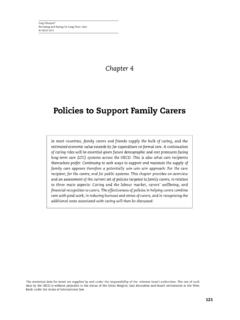Transcription of 2010 No. 1997 EDUCATION, ENGLAND - …
1 STATUTORY INSTRUMENTS 2010 No. 1997 education , ENGLAND The education (Independent School Standards) ( ENGLAND ) Regulations 2010 Made - - - - 4th August 2010 Laid before Parliament 10th August 2010 Coming into force - - 1st September 2010 The Secretary of State for education makes these Regulations in exercise of the powers conferred by sections 157(1) and 210(7) of the education Act 2002(a). Citation, commencement and application 1. (1) These Regulations may be cited as the education (Independent School Standards) ( ENGLAND ) Regulations 2010 and come into force on 1st September 2010 . (2) These Regulations apply only in relation to ENGLAND . Interpretation 2. (1) In these Regulations the 2002 Act means the education Act 2002; boarder means a pupil for whom a school provides accommodation, whether or not the pupil is a pupil at that school; employment business has the meaning given in section 13(3) of the Employment Agencies Act 1973(b); enhanced criminal record certificate means an enhanced criminal record certificate as defined in section 113B of the Police Act 1997 (c) which includes suitability information relating to children as defined in section 113BA(2)(d) of that Act; maintained school means a community, foundation or voluntary school or a community or foundation special school(e).
2 (a) 2002 See section 212(1) for the definition of regulations . (b) 1973 (c) 1997 ; section 113B was inserted by section 163(2) of the Serious Organised Crime and Police Act 2005 ( ). (d) Section 113BA was inserted by paragraph 14(4) of Schedule 9 to the Safeguarding Vulnerable Groups Act 2006 ( ) and amended by section 170(2) of the education and Inspections Act 2006 ( ), paragraph 12 of Schedule 1 to the education and Skills Act 2008 and section 81 of the Policing and Crime Act 2009 ( ). (e) See section 20 of the School Standards and Framework Act 1998 ( ) as to the categories of maintained school. 2 the National Minimum Standards for Boarding Schools means the statement of national minimum standards published under that title in July 2010 by the Secretary of State for education under section 87C(1) of the Children Act 1989(a); the National Minimum Standards for Residential Special Schools means the standards published under that title in March 2002 by the Secretary of State for Health under section 87C of the Children Act 1989; school means an independent school(b); the School Premises Regulations means the education (School Premises) Regulations 1999(c).
3 Staff means any person working at the school whether under a contract of employment, under a contract for services or otherwise than under a contract, but does not include supply staff or a volunteer; statement (except in paragraphs 24(2)(d) and 25(k) of the Schedule) means a statement of special educational needs made under section 324 of the education Act 1996(d); supply staff means any person working at the school supplied by an employment business. (2) For the purposes of these Regulations an enhanced criminal record check is made if (a) an application for an enhanced criminal record certificate is made under Part 5 of the Police Act 1997 ; and (b) the application is countersigned by a registered person (as defined in section 120 of that Act) or the application is countersigned on behalf of that person and (in either case) the application is submitted in accordance with Part 5 of that Act.
4 (3) In these Regulations, where an element of a standard is information or a document being made available , that element of the standard is met (a) in a case where the school has an internet website, if (i) the information or a copy of the document is (aa) available on the website in a form accessible to parents of pupils and parents of prospective pupils; and (bb) available for inspection on the school s premises during the school day; and (ii) the proprietor takes reasonable steps to ensure that parents of pupils and parents of prospective pupils are aware that the information or a copy of the document is available and the form in which it is available; and (b) in a case where the school has an internet website but the information or a copy of the document is not available on the website, or where the school does not have an internet website, if (i) the proprietor takes reasonable steps to ensure that parents of pupils and parents of prospective pupils are made aware that they may request the information or a copy of the document; and (ii) the information or a copy of the document is sent or given to such parents free of charge, in response to a request.
5 (a) 1989 ; section 87 was amended by section 105 of the Care Standards Act 2000 (c. 41) and section 87C was inserted by section 107 of that Act. (b) Independent school is defined in section 463 of the education Act 1996 ( ), which was substituted by section 172 of the education Act 2002 (c. 32). (c) 1999/2. (d) 1996 3 Independent school standards 3. (1) The provisions contained in Schedule 1 are the independent school standards for the purposes of Part 10 of the 2002 Act. (2) Except as provided in paragraphs (3) and (4), these standards apply to any independent school.
6 (3) The standards contained in the following provisions of Schedule 1 do not apply to an Academy (a) Part 1; (b) paragraph 24(1)(b) insofar as it relates to the information referred to in paragraph 24(3)(b), (c), (f) and (h); and (c) paragraph 24(1)(h). (4) The standards referred to in paragraph (2) of this Regulation and the standards contained in paragraphs 17 and 24(1)(f) of Schedule 1 do not apply to a city technology college or a city college for the technology of the arts(a). Revocations 4. The instruments listed in column 1 of the table in Schedule 2 (which have the references listed in column 2) are revoked to the extent indicated in column 3. Nick Gibb Minister of State 4th August 2010 Department for education SCHEDULE 1 Regulation 3(1) PART 1 Quality of education provided 1.
7 The standards about the quality of education provided at the school are those contained in this Part. 2. (1) The standard in this paragraph is met if the proprietor ensures that a written policy on the curriculum, supported by appropriate plans and schemes of work, which provides for the matters specified in sub-paragraph (2) is drawn up and implemented effectively. (2) The matters are (a) full-time supervised education for pupils of compulsory school age (construed in accordance with section 8 of the education Act 1996(b)), which gives pupils experience in linguistic, mathematical, scientific, technological, human and social, physical and aesthetic and creative education ; (b) subject matter appropriate for the ages and aptitudes of pupils, including those pupils with a statement; (c) that pupils acquire speaking, listening, literacy and numeracy skills.
8 (a) City technology colleges and city colleges for the technology of the arts were established under section 482 of the education Act 1996 (c. 56) as originally enacted. (b) 1996 c. 56. Section 8 is amended by section 52 of the education Act 1997 (c. 44). 4 (d) where the principal language of instruction is a language other than English, lessons in written and spoken English, except that this matter does not apply in respect of a school which provides education for pupils who are all temporarily resident in ENGLAND and which follows the curriculum of another country; (e) where a pupil has a statement, education which fulfils its requirements; (f) personal, social and health education which reflects the school s aim and ethos; (g) appropriate careers guidance for pupils receiving secondary education .
9 (h) where the school has pupils above compulsory school age, a programme of activities which is appropriate to their needs; (i) that all pupils have the opportunity to learn and make progress; and (j) adequate preparation of pupils for the opportunities, responsibilities and experiences of adult life. 3. The standard in this paragraph is met if the proprietor ensures that the teaching at the school (a) enables pupils to acquire new knowledge and make progress according to their ability so that they increase their understanding and develop their skills in the subjects taught; (b) fosters in pupils the application of intellectual, physical or creative effort, interest in their work and the ability to think and learn for themselves; (c) involves well planned lessons and effective teaching methods, activities and management of class time; (d) shows a good understanding of the aptitudes, needs and prior attainments of the pupils, and ensures that these are taken into account in the planning of lessons.
10 (e) demonstrates appropriate knowledge and understanding of the subject matter being taught; (f) utilises effectively classroom resources of an adequate quality, quantity and range; (g) demonstrates that a framework is in place to assess pupils work regularly and thoroughly and use information from that assessment to plan teaching so that pupils can progress; and (h) utilises effective strategies for managing behaviour and encouraging pupils to act responsibly. 4. The standard in this paragraph is met where the proprietor ensures that a framework for pupil performance to be evaluated, by reference either to the school s own aims as provided to parents or national norms, or to both, is in place. PART 2 Spiritual, moral, social and cultural development of pupils 5. The standard about the spiritual, moral, social and cultural development of pupils at the school is met if the proprietor ensures that principles are promoted which (a) enable pupils to develop their self-knowledge, self-esteem and self-confidence; (b) enable pupils to distinguish right from wrong and to respect the law; (c) encourage pupils to accept responsibility for their behaviour, show initiative and understand how they can contribute to community life; (d) provide pupils with a broad general knowledge of public institutions and services in ENGLAND ; and (e) assist pupils to acquire an appreciation of and respect for their own and other cultures in a way that promotes tolerance and harmony between different cultural traditions.
